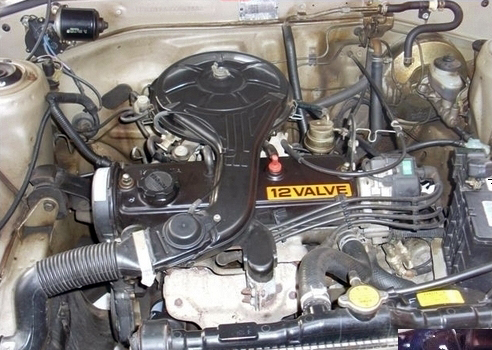Drive with Self-confidence: Toyota Tazz Engine for Sale, Genuine Components Just
Drive with Self-confidence: Toyota Tazz Engine for Sale, Genuine Components Just
Blog Article
Engine Purchasing Specialist Tips on Picking the Right Engine for Your Details Requirements
Choosing the right engine for your details demands includes a complicated interplay of variables that go past simple horsepower figures. By diving into the intricacies of power versus performance, reviewing gas scores, and budgeting for long-term prices, one can genuinely optimize their engine option.
Power Vs. Effectiveness: Finding the Equilibrium

When choosing an engine, it is important to strike a balance between power and effectiveness to meet your details requirements efficiently. Power refers to the engine's ability to produce power for propulsion, figuring out elements like velocity, pulling capability, and overall efficiency (Toyota Tazz Engine For Sale). On the various other hand, efficiency connects to exactly how well the engine utilizes gas to generate power, influencing aspects such as fuel economic situation and environmental kindness
Accomplishing the best balance in between power and efficiency is important due to the fact that an engine that is as well powerful might consume too much fuel, bring about higher operating prices and unnecessary stress on the setting. On the other hand, an engine that prioritizes effectiveness over power might result in slow efficiency, particularly in requiring situations like lugging heavy tons or driving uphill.
To make an informed choice, consider aspects such as your typical driving conditions, the desired usage of the car, and your individual choices. By evaluating your top priorities and requirements, you can choose an engine that strikes the best balance in between power and efficiency, making sure optimum efficiency while decreasing environmental effect and operating expense.
Recognizing Engine Size and Type

Furthermore, engine kind plays an essential function in figuring out the efficiency features of an engine. Common engine kinds consist of inline engines, V engines, and rotary engines, each with its distinct benefits and downsides. The engine kind influences variables such as the engine's dimension, weight circulation, and power shipment. Understanding the interplay between engine size and type is essential in picking an engine that straightens with your specific needs and priorities, whether it be power, efficiency, or an equilibrium of both.
Consider Your Lorry's Demands
If you are looking for an engine for a sturdy truck that will be utilized for towing, you will certainly require a powerful engine with high torque capabilities. On the various other hand, if you are selecting an engine for a small auto primarily utilized for city travelling, gas performance may be a much more essential factor to consider.

Evaluating Gas Performance Rankings
Analyzing gas effectiveness scores is a crucial aspect of selecting the appropriate engine for your car, making sure expense savings and ecological sustainability. Gas effectiveness ratings, generally measured in miles visit the site per gallon (MPG) for fuel engines or kilowatt-hours per 100 miles (kWh/100 miles) for electrical engines, suggest how far a vehicle can take a trip on a certain amount of gas or power. Greater MPG or reduced kWh/100 miles worths symbolize much more efficient engines, converting to minimized fuel prices and reduced carbon discharges.
When assessing gas performance ratings, consider your driving habits and demands. If you commute cross countries daily, a very fuel-efficient engine can lead to significant cost savings over time. Furthermore, compare various engine options within the exact same vehicle course to identify one of the most cost-effective selection. Elements such as engine dimension, weight, aerodynamics, and crossbreed or electric abilities can all affect fuel effectiveness.
Budgeting for Long-Term Expenses
Strategically preparing for long-lasting costs is essential when choosing an engine, making sure monetary sustainability over the car's life-span. While the first purchase price of an engine is a significant element, it is essential to take into consideration the lasting expenses linked with upkeep, fixings, and fuel intake.
Furthermore, researching the accessibility and price of replacement components for the chosen engine is vital in spending plan planning. Engines with easily offered and inexpensive parts can substantially impact long-lasting maintenance expenses. Additionally, considering the engine's durability and expected lifespan can help avoid unexpected replacement costs in the future. By carefully budgeting for these long-term costs and factoring them into the decision-making process, people can select an engine that not just fulfills their prompt needs however likewise remains cost-effective throughout its life expectancy.
Final Thought
To conclude, selecting the best engine for your details demands needs balancing power and performance, recognizing engine dimension and kind, considering your lorry's demands, reviewing gas effectiveness scores, and budgeting for long-term costs. By carefully thinking about these variables, you can make sure that you select an engine that satisfies your Get More Information demands and offers optimal performance for your car.
To additionally fine-tune the selection process of an engine that strikes the optimum equilibrium in between power and efficiency, it is vital to dig into the details of understanding engine size and type. Engine dimension refers to the complete quantity of air and fuel that can be pushed with the engine cylinders. Common engine kinds consist of inline engines, V engines, and rotary engines, each with its distinct advantages and drawbacks. Recognizing the interplay between engine size and kind is vital in selecting an engine that aligns with your details needs and priorities, whether it be power, performance, or a balance of both.
Fuel performance rankings, typically gauged in miles per gallon (MPG) for fuel engines or kilowatt-hours per 100 miles click to read more (kWh/100 miles) for electric engines, indicate how much an automobile can travel on a certain amount of gas or electrical power.
Report this page